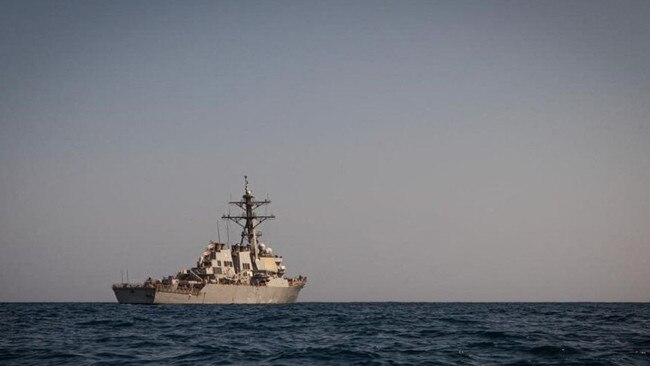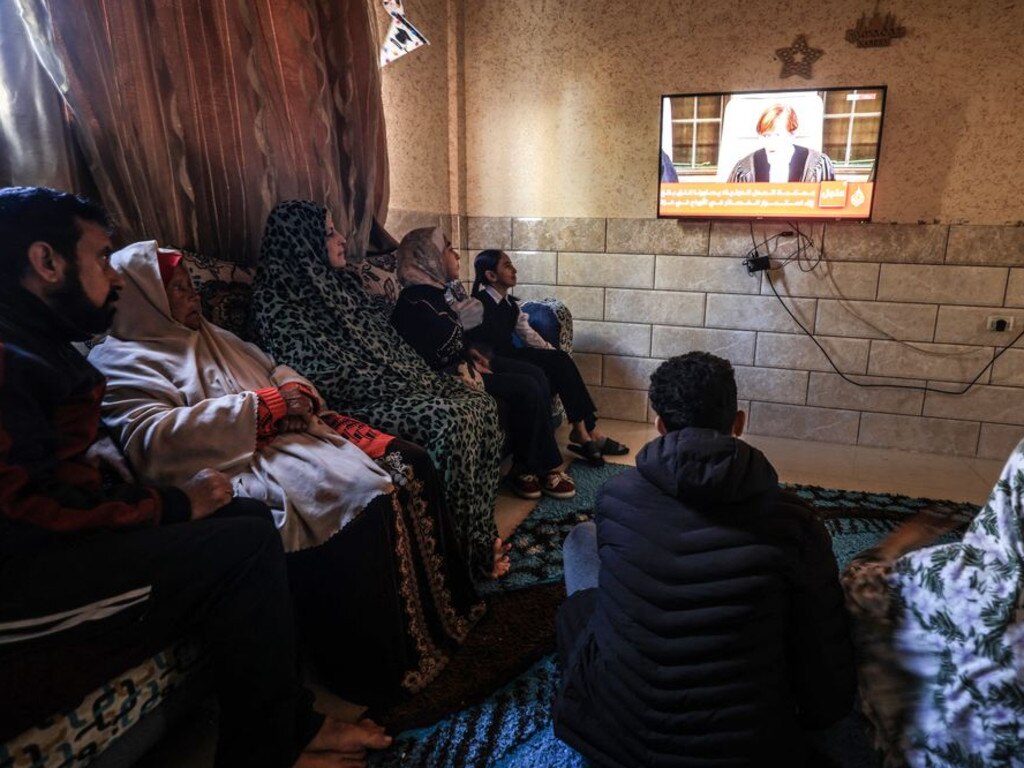Houthis attack US warship, British oil tanker, as China urges Iran to lean on group to halt campaign
One of the most significant attacks yet on an oil-carrying vessel came as China urged a noncooperative Iran to help rein in the Yemeni rebel group.

A Yemeni rebel group launched missiles at a U.S. destroyer and a British tanker, as China pressed Iran to lean on the Houthis to halt their attacks in the Red Sea that have sent global shipping costs surging.
The Marlin Luanda, a fuel tanker sailing on behalf of trading giant Trafigura Group, was struck by a missile in the Gulf of Aden, in one of the most significant attacks yet by Yemen’s Houthi rebels on an oil-carrying vessel.
“Firefighting equipment on board is being deployed to suppress and control the fire caused in one cargo tank on the starboard side,” a Trafigura spokesperson said in a statement.
“We remain in contact with the vessel and are monitoring the situation carefully.” In conversations in Tehran and Beijing, Chinese officials asked their Iranian counterparts to rein in their Yemeni ally, an Iranian official and an Iranian government adviser said. Iran officials told the Chinese that they were not in control of the group and that turmoil in the region would end if Israel agreed to a ceasefire, the Iranians said.
China hasn’t commented directly on its talks with Iran, but a spokesman for its foreign ministry in Beijing said Friday the country had “actively deescalated the situation, called for an end to the disturbance to civilian ships, and urged relevant parties to avoid fueling the tensions.” A spokesman for the Iranian delegation at the United Nations didn’t respond to a request for comment.
Administration officials have asked Beijing to convey messages to Iran about avoiding a broader conflict in the region, since the Oct. 7 start of Israel’s war in Gaza. The US says Iran supplies the Houthis with weapons, funding and other support. White House national security adviser Jake Sullivan met in Thailand Thursday with Beijing’s top foreign-policy official, Wang Yi, to discuss the matter.
On Friday, a US destroyer, the USS Carney, shot down a ballistic missile fired toward it from a Houthi-controlled area of Yemen, the Pentagon said, marking the second time the US has announced that the group has targeted one of its military vessels.
In each instance, the rebels have targeted Navy destroyers within days of coalition attacks aimed at Houthi sites. The strikes by the US and UK are intended to weaken the group and secure ships passing through the Gulf of Aden and Rea Sea.
The exchange of fire caused no damages or casualties, US Central Command, which is responsible for US military operations in the Middle East, said in a tweet.

A British tanker, the Marlin Luanda, was hit by a missile Friday, said Chris Long, head of intelligence at British security consultancy Neptune P2P Group. Fire was reported on board but it’s unclear how much damage it caused, he said.
Trafigura said the attacked vessel was run on its behalf. The ship’s managing company, Oceonix Services in London, couldn’t be reached for comment.
Yahya Saree, a Houthi spokesman, in a statement confirmed the group had fired on the Marlin Luanda “in support of the injustice against the Palestinian people and as a response to the American-British aggression on our country.”
Early Saturday Yemen time, the US launched a strike against a “Houthi anti-ship missile aimed into the Red Sea and which was prepared to launch,” said Centcom, adding that the missile was destroyed in self-defence.
The US is trying to stop the attacks by the Iranian-backed group without escalating tensions in an already volatile region. The Houthis have said their campaign will continue until Israel halts the fighting in Gaza and humanitarian aid is let in. The Houthis may be targeting US Navy ships shortly after major strikes to demonstrate they haven’t been stopped, US officials said.
China is Iran’s largest oil buyer, giving it leverage on the heavily-sanctioned Islamic Republic. Last year, Beijing also brokered a deal to normalise relations between Tehran and Saudi Arabia after years of tensions.
The Houthis began attacking ships travelling through the Red Sea and on the Gulf of Aden at the end of November in what they said was a response to Israel’s war against Hamas in Gaza, rattling global markets and upending international shipping routes.
Though eager to protect global shipping, the Biden administration has been reluctant to respond too forcefully to the Houthis lest it trigger a war in the region, in part because of the group’s backing from Tehran, Western security officials and advisers have said.
The US led a coalition that has launched two major assaults on Houthi-controlled parts of Yemen, including one last week, while the US alone has launched at least six other limited strikes. Targets included rocket launchers, missile depots, an underground weapons storage facility, warehouses, drones used by the Houthis and radar, missile and air surveillance sites, some of them near the capital San’a, US, British and Houthi officials have said.
Days after the first major coalition assault, which targeted more than a dozen sites, the USS Laboon, another American destroyer, shot down an antiship cruise missile launched by the Houthis, Central Command said. There were no reports of damages on the Laboon or casualties, the Pentagon said then.
The US has so far refused to say the impact of the coalition assaults on the Houthis except to say they have had “good effects,” destroying roughly 30 per cent of Houthi capabilities. Despite that, the Houthis have continued launching attacks on commercial ships passing, more than 30 in all. And the Houthis have been defiant after each strike, saying that they would keep attacking ships.
Houthi fighters overthrew the Yemeni government in 2014, leading Saudi Arabia and other Arab nations to mount a military campaign against the rebels. Months of talks between Saudi Arabia and the Houthis have produced a road map that the US hopes could lead to resolution of the conflict. But those talks have since stalled.
Privately, US defence officials have said that strikes alone are unlikely to deter the Houthis, who both have survived a decade of war and, since their attacks on nearby waters, enjoyed an elevated status in a region angered by Israel’s war in Gaza.
Biden administration officials have said that Beijing is pressing the Iranians, but they don’t know the exact substance of those conversations. The US says Iran supplies the Houthis with weapons, funding and other support.
The Carney has come under Houthi attacks in the past, but in those instances, the US has stopped short of saying its military ships were the targets. And some of those strikes have come as the destroyer responded to distress calls from nearby commercial ships also under Houthi attack. In December, the Carney struck a drone that was headed toward the destroyer, “although its specific target is not clear,” the Pentagon said at the time.
Shortly after that shootdown, the M/V Unity Explorer, a Bahamas-flagged bulk cargo ship, came under ballistic-missile attack and sent a distress call, leading the Carney to move toward the ship in response, Central Command said.
As the Carney was assessing the damage on the commercial ship, it spotted a second drone operating nearby and shot it down, Central Command said.
– Saleh al-Batati contributed to this article.
The Wall Street Journal






To join the conversation, please log in. Don't have an account? Register
Join the conversation, you are commenting as Logout